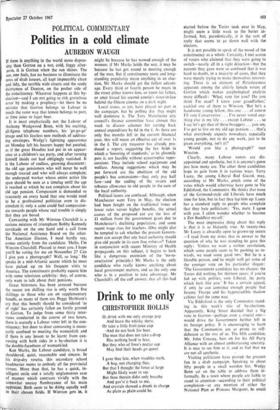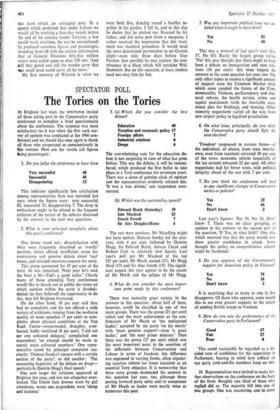Politics in a cold climate
POLITICAL COMMENTARY AUBERON WAUGH
If there is anything in the world more depres- sing than Gorton on a wet, cold, foggy after- noon, it is Gorton when the sun shines. The
gun, one feels, has no business to illuminate the rows of drab houses, all kept impeccably clean
and tidy, the terrible wide streets and the seedy daintyness of Denton, on the posher side of the constituency. Whatever happens at this by- election—and I am not going to risk gratuitous error by making a prophecy—let there be no mistake that Gorton belongs to Labour in much the same way that lemon belongs to port, or lime juice to lager beer.
It is most emphatically not the Labour of Anthony Wedgwood Benn, with his exciting, all-figure telephone numbers, his 'go-go-go' image and his fearless new methods of address- ing envelopes. Wedgy's lightning appearance on Monday left his hearers happy but puzzled, as if the great Houdini had put in an appear- ance at a children's tea party, and after turning himself inside out had obligingly vanished. It is the Labour of endless, gnawing discontent: the old age pensioners who will never be well enough treated and who will always complain; the underpaid worker whose entire active life span should be seen as a timelag until the age is reached at which he can complain about his old age pension. Compassion is demanded so raucously on every hand that one would need to be a professional politician even to dis- simulate it; only a saint could feel compassion- ate towards people whose real trouble is simply that they are bored.
Canvassing with Mr Winston Churchill is a curious mixture of triumphant Bobby Kennedy cavalcade on the one hand and a call from the National Assistance Board on the other. The American illusion, I need hardly say, comes entirely from the candidate. 'Hello, I'm Winston Churchill. Pleased to meet you. I hope you'll be voting for me on November 2? Can I give you a photograph? Well, so long.' He speaks in a mid-Atlantic accent which he must have picked up on his frequent visits to America. The constituents probably equate him with some television celebrity; they, of course, only want to talk about their pensions.
Great bitterness has been aroused because the recent ten shilling rise is only worth five shillings to those who are on supplementary benefit, as many of them are. Peggy Herbison's cry that this benefit should be considered 'as of right' has certainly fallen on fertile ground in Gorton. To judge from some thirty inter- views conducted in the course of two hours, there is scarcely a Labour voter left in the con- stituency; but door to door canvassing is neces- sarily confined to meeting the womenfolk and if there is any lesson to be learnt from can- vassing with both sides in a by-election it is the double-facedness of womankind.
Ken Marks, the Labour candidate, is broad shouldered, quiet, reasonable and sincere. In his drip-dry rosette, this secondary school headmaster seems to embody all the provincial virtues. More than that, he has a quick, in- telligent smile and a totally unglamorous ease of manner which contrasts vividly with the somewhat uneasy flamboyance of his main opkionent. Both seem to be doing equally well in their chosen fields. If Winston gets in, it might be because he has wowed enough of the women; if Mr Marks holds the seat, it may be because he has got round to meeting enough of the men. But if constituency roots and long- standing popularity mean anything in an elec- tion, Mr Marks should get the fullest advant- age. Every third or fourth person he meets in the street either knows him, or knew his father, or once kissed his second cousin's sister-in-law behind the Odeon cinema on a dark night.
Local issues, as yet, have played no part in the campaign, but by polling day they might well dominate it. The Tory Manchester city council's finance committee have chosen this week to discuss schemes for cutting back annual expenditure by 6d in the £. As there are only five months left in the current financial year, this will mean an effective cut of over Is in the £. The city treasurer has already pro- duced a report, suggesting the few fields in which a 'lowering of standards,' as he gloomily puts it, are feasible without catastrophic reper- cussions. They include school equipment and welfare. Among suggestions which may be put forward are the abolition of the old people's bus concessions—they only pay half fare—and the ending of the sweets and tobacco allowance to old people in the care of the local authority.
Political issues are confused. Although. when Manchester went Tory in May, the election had been fought on the traditional issues of lower rates versus higher benefits, the actual causes of the proposed cut are the loss of £1 million from the government grant due to Manchester's declining population, and some recent wage rises for teachers. (One might also be tempted to ask whether the present Govern- ment can accept that any local authority should give old people in its care free tobacco? Taken in conjunction with recent Ministry of Health propaganda on this subject, it begins to look like a dangerous extension of the 'no-re- suscitation' principle.) Mr Marks is the only candidate who really knows anything about local government matters, and so the only one who is in a position to take advantage; Mr Churchill's off the cuff answer, that all this had started before the Tories took over in May, might seem a little weak to the better in- formed, but, paradoxically, it is the sort of reply that seems to go down well with the electors.
It is not possible to speak of the mood of the constituency as a whole. Certainly, I met scores of voters who claimed that they were going to switch—nearly all in a right direction—but the reasons they gave were so confused that it was hard to doubt, in a majority of cases, that they were merely trying to make themselves interest- ing. There is an element of flirtatiousness apparent among the elderly female voters of Gorton which makes psephological analysis more difficult: 'What, vote for you? Do you think I'm mad? I knew your grandfather,' cackled one of them to Winston. 'But he's a handsome young fellow, this one. .. of course I'll vote Conservative . .. I've never voted any- thing else in my life . . . except Labour ... so I say let's get shot of these booggers ... you see, I've got to live on my old age pension ... that's what everybody expects nowadays, especially young people, not to do any work, just to be given everything, isn't it?' - 'Would you like a photograph?' says Winston.
Clearly, many Labour voters are dis- appointed and apathetic, but it is anyone's guess just how many are. The other three candidates hope to gain from it in various ways. Terry Lacey, the young Liberal Red Guard, may, according to Mr Marks, pinch some of the votes which would otherwise have gone to Vic Eddisford, the Communist. He thinks that none of the Grimond-style old Liberals have much time for him, but in fact they lap him up. Lacey has a standard reply to people who complain that they hate politicians: 'Yes, mate. I agree with you. I often wonder whether to become a Zen Buddhist myself.'
The most impressive thing about this reply is that it is so blatantly true. At twenty-two Mr Lacey is absurdly open to grown-up sneers —I read from my notes that in answer to the question of why he was standing he gave this reply: 'Unless we want a violent revolution, which some people seem to be pushing us to- wards, we need some good Ml's.' But he is a likeable person, and he might well get some of the younger vote on his particular slogan: 'The Government candidate has no chance; the Tories did nothing for thirteen years; if you're fed up with politics, vote Liberal, the party which feels like you.' It has a certain appeal, if only he can convince enough people that Jeremy Thorpe and his hypercredible shadow cabinet feel the same way.
Vic Eddisford is the only Communist stand- ing in this week's trio of by-elections. Apparently, King Street decided that a big vote in Gorton—perhaps even a crucial one— would drive the Government further left in its foreign policy. It is encouraging to learn that the Communists are as prone to self- delusion as the rest of us. The fifth candidate, Mr. John Creasey, bats on for his All Party Alliance with an almost embarrassing sincerity. It is nice to see him at it, and to feel that we are not all apathetic.
Visiting politicians have proved the greatest fun in a drab campaign. Speaking to about fifty people in a small wooden hut, Wedgy Berm sat on the table to address them in- formally. In a town where people are liable to stand to attention—according to their political complexion—at any mention of either the National Plan or Princess Margaret, he could
not have struck an unhappier note. In a speech which predicted that under Labour we would all be working a four-day month before the end of the century (under Toryism, a few would work overtime, the rest be unemployed) he produced countless figures and percentages, rounding them off with the curious information that at General Elections fifty-five million voters were called upon to elect 350 MPS. 'And still they gazed and still the wonder grew that sow small head could carry all he knew.'
My first memory of Winston is when we were both five, dancing round a bonfire to- gether in his garden. I fell in, and to this day he denies that he phshed me. Rescued by his father, and fed some port from a teaspoon, I rather received the impression that this treat- ment was standard procedure. It would need the most determined pyromaniac to set Gorton alight—even only three days before Guy Fawkes. Just possibly he may capture the con- stituency in a blaze which will outshine Wal- thamstow. But on this occasion, at least, readers need not envy him his fun.











































 Previous page
Previous page